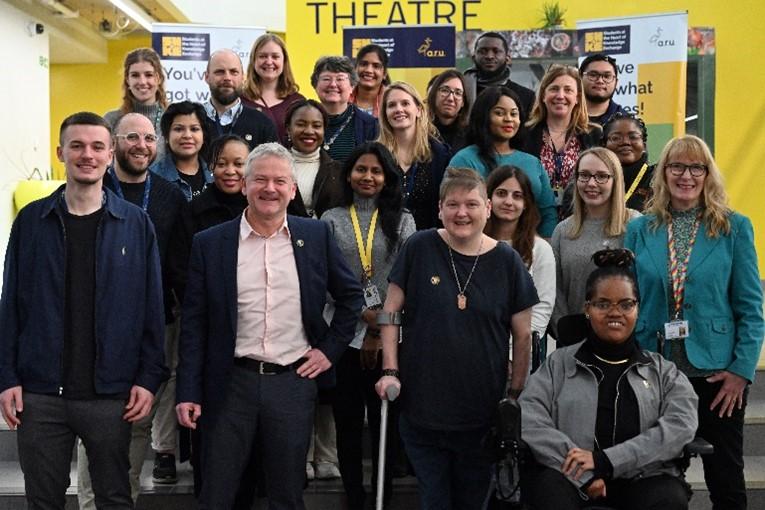Inequality is so entrenched in the UK that one in five people live in poverty, housing is increasingly precarious, and food banks now outnumber McDonald’s franchises two to one.
Often widely accepted, such deep-rooted inequality shapes opportunities and development in education. Geography and socio-economic status will predict a child’s grades, university access and relationship with the labour market long before they enter a classroom – ultimately perpetuating a system where there are glass ceilings for some and inbuilt safety nets for those who do not live in poverty.
- Pay it forward: how to help students secure financial aid
- We must remove technology worries from the student cost-of-living crisis
- How to attract students who think they cannot afford higher education
With this in mind, universities must be awake to the reality of what many students bring with them when they enter higher education: the invisible baggage of poverty, inequality and the consequential trauma associated with these circumstances. For instance, the tripling of mental health referrals among students over the past decade is not an inexplicable trend; it is etched with the fingerprints of austerity and cost-of-living crises, impacting student development and often resulting in interruptions to student retention and progression. For many, it is difficult to be curious about literature, medicine, psychology or sport science when you're occupied by your caring responsibilities, the rising cost of essentials and rent, tuition fees or mental health issues.
Even if you can endure that, you will likely be one of the 55 per cent of students in the UK working part time, competing with peers who can engage fully in university life without financial constraints.
Although this may seem overly pessimistic, we must be cognisant of the narratives constructed around disadvantaged populations, in which they are depicted as unintelligent or lacking in aspiration while viewing higher education as a tangible vehicle of social mobility. At my institution, where nearly 30 per cent of students are drawn from Scotland’s most deprived areas (according to the Scottish Index of Multiple Deprivation), the barriers to student development are often deeply rooted in structural inequality and demand thoughtful attention. With such a high proportion of students from low SIMD backgrounds, the impact of poverty and exclusion is unavoidably clear. In acknowledging these harsh realities, university staff must adopt strategies that not only address the barriers associated with poverty and consequential trauma, but actively create opportunities for empowerment and growth, enabling students to fulfil their potential.
In 2014, the Substance Abuse and Mental Health Services Administration outlined six trauma-informed principles emerging as the hallmarks of good practice in substance rehabilitation, social care, elite sports and education contexts. These principles are adopted as part of the Trauma-Informed Pedagogy in Academia Project at my institution, which is aiming to make pedagogy in higher education more inclusive and impactful for students from diverse backgrounds. These principles are:
Safety encompasses the construction of spaces that challenge the perception of education as a hostile environment dominated by complex hierarchical relationships. Students should feel supported to make mistakes, learn from them and share ideas without fear of ridicule or judgement. Vulnerability must be met with care, and support-seeking behaviour should be actively encouraged. To foster this sense of safety, lecturers can set clear boundaries, adopt approachable behaviours and maintain predictable routines.
Trust and transparency are particularly important to students from disadvantaged backgrounds who might distrust large institutions and value authenticity. Universities must ensure their policies, curriculum and support systems are transparent and reliable – doing what they say they will do, and doing it consistently. Inconsistency breeds disengagement and distrust, increasing the risk of dropout.
Peer support is creating collaborative environments that are fertile for innovation but also useful for challenging preconceived ideas or ill truths about academic issues, particularly around trauma and trauma survivors. Beyond pedagogy, peer support becomes vital when formal systems fail to recognise the adversities that impact a student’s education and beyond. Lecturers and universities can achieve this by fostering collaborative environments, facilitating peer-led initiatives and creating spaces where students can share experiences, challenge stigma and build resilience together.
Building on peer support, collaboration and mutuality encourage co-constructed environments while being cognisant that power differentials need to be levelled to achieve this. It is a consciousness of the perceived distance among us: the institution, the lecturer, the knowledgeable and them (the student, the inexperienced and the ill-informed). We must recognise the value that can be derived from the lived experiences of trauma and poverty and do so without commodifying this knowledge or using it to exacerbate power imbalances. This can manifest in practice that embraces co-design in aspects of curriculum that reflect the diverse perspectives and the rich experiences of students.
Empowerment, voice and choice is ensuring students have a voice in shaping their own journey to ensure they do not feel like an imposter in an environment that they think was not designed for them. If we empower trauma survivors, give them a voice and provide them with the tools to fulfil their ambitions, they can become valuable contributors towards a meaningful change in our society.
Cultural, historical and gender issues challenge both assumptions and entrenched inequalities that universities should remain untouched ivory towers for those from different sociocultural, ethnic and gender-identity backgrounds. It is policies, practices and behaviours championing meritocracy through action. For lecturers, this means integrating diverse perspectives into our curriculum and developing materials that reflect nuanced experiences and wide ranges of background, while being mindful of the challenges students may endure outside of the classroom. For policymakers and university leaders, this represents opening doors, widening access and ensuring the talented, committed and motivated succeed regardless of past lived experiences or cultural stereotypes and social biases.
Taken together, these trauma-informed principles offer more than an ethical imperative; they provide a tangible path toward dismantling entrenched inequalities. If policymakers and university leadership across the nation embraced trauma-informed practice, we could transform higher education into a space for learning, healing and genuine empowerment — ensuring disadvantaged students are not just included but truly supported to succeed.
Jordan Donnelly is a lecturer in sport coaching and development at the University of the West of Scotland.
If you’d like advice and insight from academics and university staff delivered direct to your inbox each week, sign up for the Campus newsletter.




comment